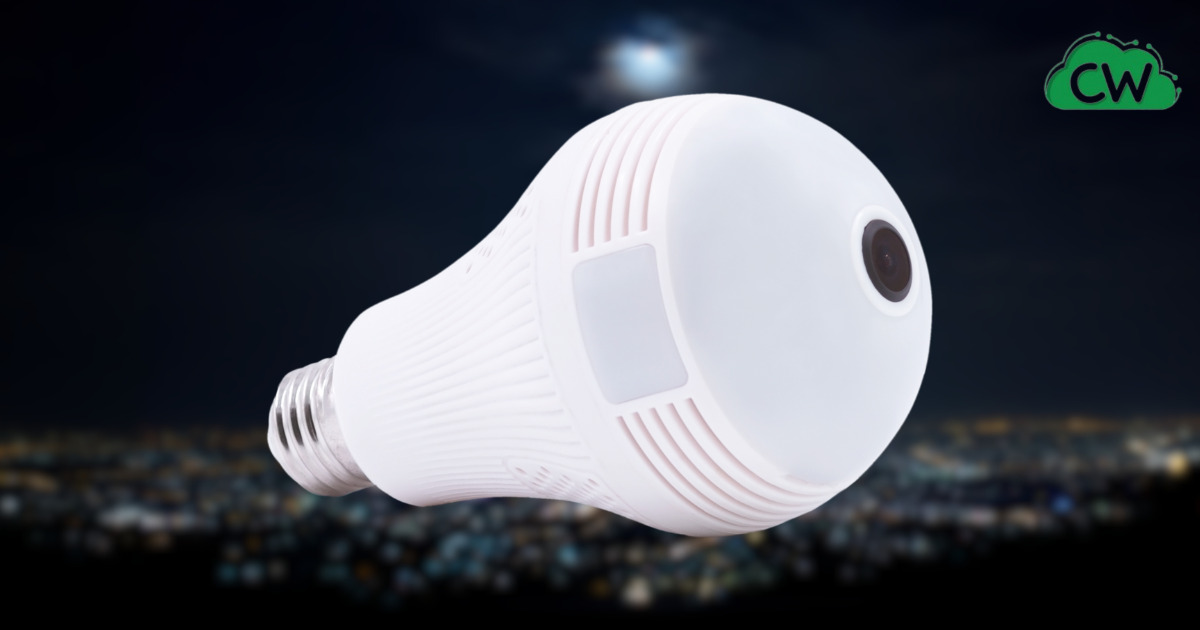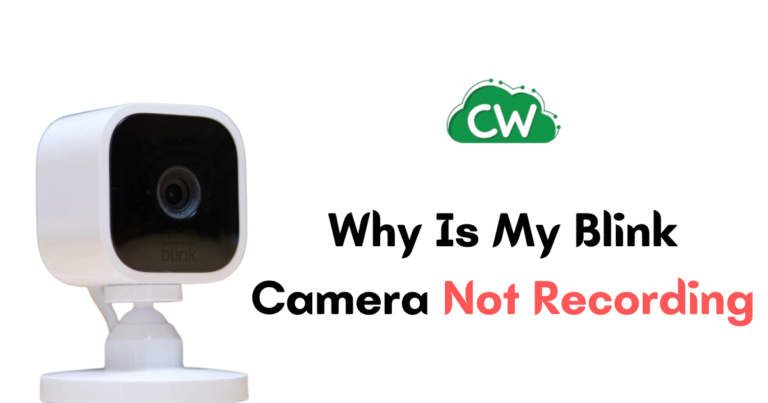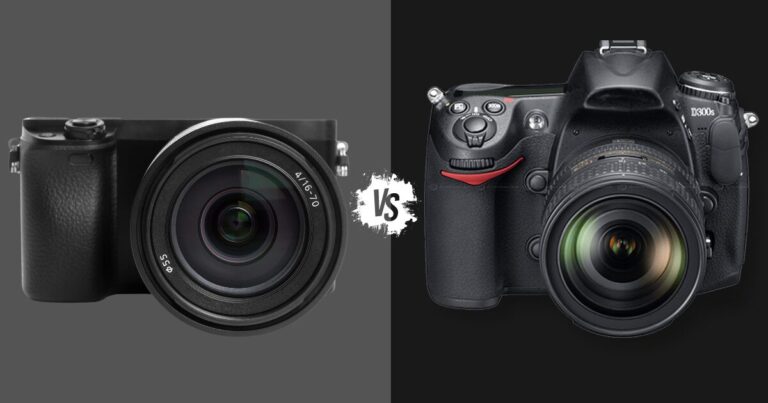Do Light Bulb Cameras Work When the Light is Off? (The Truth)

Light bulb cameras are a popular choice for home and business surveillance, offering discreet and convenient monitoring. But an important question arises: do these cameras function when the light is off?
Let’s explore this topic and shed some light on it.
Do Light Bulb Cameras Work When the Light is Off?
Yes, light bulb cameras do work when the light is off. They are equipped with infrared night vision technology that allows them to capture video footage in low-light conditions or complete darkness.
The cameras switch to infrared mode automatically when the light is turned off, enabling continuous surveillance regardless of the lighting conditions.
Infrared Night Vision Functionality
Most light bulb cameras transition to infrared night vision mode when the light is switched off. This feature allows the camera to continue capturing video footage even in complete darkness.
With the help of infrared (IR) technology, the camera can detect and record images in low-light conditions, providing a reliable surveillance solution for areas that are poorly lit.
During infrared night vision mode, the camera uses IR LEDs to illuminate the scene with infrared light that is invisible to the human eye but can be detected by the camera’s sensor.
This allows the camera to create a grayscale image or video feed, albeit with reduced clarity compared to footage captured in well-lit conditions.
It’s important to note that the range and quality of infrared night vision can vary depending on the specific light bulb camera model. Some cameras may have a shorter range and produce less clear footage in complete darkness, while others may offer longer range and better image quality.
Factors such as camera placement, camera quality, and the presence of any obstructions can also affect the performance of infrared night vision.
Benefits of Infrared Night Vision Functionality
- Continuous surveillance: With infrared night vision, light bulb cameras can monitor areas even when the lights are off, ensuring continuous surveillance and peace of mind.
- Covert monitoring: Infrared night vision enables discreet monitoring, as the infrared light is not visible to the naked eye. This makes light bulb cameras suitable for covert surveillance applications.
- Enhanced security: By providing visibility in low-light or dark environments, infrared night vision functionality helps enhance the security of homes, businesses, and other premises.
Motion Detection in Light Bulb Cameras
Light bulb cameras are equipped with advanced motion detection technology that allows them to detect and record movement in their monitoring area, even when the light is off.
This feature makes them highly effective for capturing footage of intruders or other unwanted visitors. When motion is detected, the camera will automatically start recording, ensuring that you have a visual record of any activity in the area being monitored.
Motion detection in light bulb cameras works by analyzing changes in the video feed. The camera constantly compares frames and identifies any variations that indicate movement.
This can include the movement of people, objects, or even changes in lighting conditions. Once detected, the camera will send an alert to the user’s smartphone or other connected devices, allowing them to view the live feed or access recorded footage.
Setting up motion detection in light bulb cameras is usually a straightforward process. Users can customize the sensitivity levels to avoid false alarms from things like pets or moving curtains.
Additionally, some cameras offer the option to define specific areas within the monitoring range where motion detection should be active.
This allows for more targeted surveillance and reduces the chances of unnecessary recordings.
Audio Recording
One of the notable features of light bulb cameras is their ability to capture audio in addition to video footage.
Even when the light is turned off, these cameras continue to record sound, providing an effective way to monitor conversations or other sounds in the area they are monitoring.
This can be especially useful for keeping an audio record of important events or for capturing evidence in case of any incidents.
Audio recording is a valuable addition to the surveillance capabilities of light bulb cameras. It allows for a more comprehensive and detailed understanding of the environment being monitored. By capturing both visual and auditory information, these cameras provide a more complete picture of the events taking place.
When using light bulb cameras for audio recording, it is important to consider privacy regulations and local laws.
It is crucial to inform individuals present in the monitored area that audio recording is taking place to ensure compliance with legal requirements and ethical considerations.
Privacy Considerations
While audio recording can enhance the monitoring capabilities of light bulb cameras, it is essential to balance security needs with privacy concerns.
In some jurisdictions, recording audio without consent may be illegal. It is important to consult local laws and regulations to determine the legality and ethical implications of audio recording in the specific area where the light bulb cameras are being used.
| Pros of Audio Recording with Light Bulb Cameras | Cons of Audio Recording with Light Bulb Cameras |
|---|---|
| – Provides a more comprehensive surveillance experience. | – Potential privacy concerns and legal implications. |
| – Helps capture important audio evidence in case of incidents. | – Requires informed consent from individuals being recorded. |
| – Allows for better understanding of the environment being monitored. | – Can raise ethical questions about invasion of privacy. |
Factors Affecting Light Bulb Camera Performance
| Factors | Impact on Light Bulb Camera Performance |
|---|---|
| Lighting Conditions | Can affect the clarity of footage captured in night vision mode |
| Camera Placement | Avoiding glare or reflection from nearby light sources |
| Internet Connection | Quality and stability affect video transmission and connectivity |
| Camera Quality | Better quality cameras offer enhanced night vision capabilities and clearer images |
When it comes to the performance of light bulb cameras when the light is off, several factors come into play. These factors can affect the overall functionality and effectiveness of these cameras in low-light or dark environments.
Knowing these factors is crucial in order to optimize the performance of light bulb cameras and ensure reliable surveillance.
Lighting Conditions
One of the key factors that can impact the performance of light bulb cameras when the light is off is the lighting conditions in the monitored area.
Infrared night vision technology allows these cameras to capture footage even in complete darkness. The clarity of the captured footage can be affected by the level of darkness and the presence of any ambient light sources.
It is important to consider the level of illumination required for the camera to produce clear and detailed images in low-light conditions.
Camera Placement
The placement of the light bulb camera is another crucial factor that can affect its performance when the light is off. It is important to avoid placing the camera in a position where it may be affected by glare or reflection from nearby light sources.
By positioning the camera strategically, you can ensure that it captures the desired monitoring area without any interference from external light sources.
Internet Connection
The quality and stability of the internet connection can also impact the performance of light bulb cameras. A poor internet connection can result in delays in video transmission or intermittent connectivity issues.
It is important to have a reliable and high-speed internet connection to ensure a smooth and uninterrupted monitoring experience, especially when the light is off.
Camera Quality
The quality of the light bulb camera itself plays a significant role in its performance when the light is off. Higher-quality cameras generally have better night vision capabilities and produce clearer images in low-light conditions.
It is recommended to invest in a high-quality light bulb camera that meets your specific surveillance needs and provides optimal performance even when the light is off.
FAQ
Do light bulb cameras work when the light is off?
Yes, light bulb cameras are designed to function independently of the light bulb’s illumination function. They can still record and monitor the surroundings even if the light bulb is switched off.
How do light bulb cameras work in low-light or dark environments?
When the light is turned off, most light bulb cameras switch to infrared night vision mode. This allows them to capture video footage even in complete darkness, making them suitable for monitoring areas that are poorly lit.
Can light bulb cameras still record when the light is off?
Yes, light bulb cameras have motion detection capabilities. Even when the light is off, the camera will automatically start recording when it detects movement in its monitoring area.
Do light bulb cameras have audio recording capabilities when the light is off?
Yes, some light bulb cameras also have audio recording capabilities. When the light is off, the camera’s audio recording feature will still work, providing an effective way to monitor conversations or other sounds in the area it’s monitoring.
What factors can affect the performance of light bulb cameras when the light is off?
Several factors can affect the performance of light bulb cameras in low-light or dark environments. These include lighting conditions, camera placement, internet connection, and camera quality.
Are light bulb cameras effective for monitoring homes and businesses when the light is off?
Yes, light bulb cameras are a versatile and effective way to monitor homes and businesses. They continue to function when the light is off due to their infrared night vision, motion detection, and audio recording capabilities. However, the quality of the footage captured in night vision mode may not be as clear as it would be with the light turned on. Consider the specific factors affecting camera performance when using light bulb cameras in low-light or dark environments.
After exploring the functionality of light bulb cameras when the light is off, it’s clear that these devices are designed to work effectively in low-light or dark environments.
Thanks to their infrared night vision capabilities, light bulb cameras can continue capturing video footage even without the illumination provided by the bulb. This makes them a reliable option for monitoring spaces that may not have adequate lighting.
It’s important to note that the quality of the footage captured in night vision mode may not be as clear as it would be with the light turned on.
With motion detection capabilities, light bulb cameras can still automatically start recording when movement is detected in their monitoring area. This feature makes them highly effective for capturing evidence of intrusions or other unwanted activities.
In addition to video recording, some light bulb cameras also have audio recording capabilities. This means that even when the light is off, these cameras can capture sound, providing an extra layer of monitoring and security.
Whether it’s monitoring conversations or other sounds in the area, this feature makes light bulb cameras even more versatile.
When using light bulb cameras in low-light or dark environments, it’s important to consider several factors that can affect their performance.
Lighting conditions, camera placement, internet connection, and camera quality all play a role in the overall effectiveness of these devices.
Careful consideration of these factors can help ensure optimal performance and clearer footage even when the light is off.





